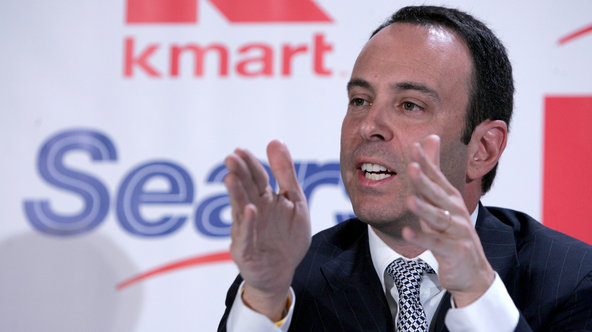 Vincent Laforet/The New York TimesEdward Lampert, seen in 2004, controls just under 60 percent of the shares of Sears Holdings.
Vincent Laforet/The New York TimesEdward Lampert, seen in 2004, controls just under 60 percent of the shares of Sears Holdings.
When big-name investors increase their personal stakes in stocks, the purchases can be a positive sign for the companies.
Edward S. Lampert sent a murkier message this week after buying extra shares in Sears Holdings, the troubled retailer.
Mr. Lampert, who controls just under 60 percent of the retailer’s shares through his hedge funds and his own portfolio, recently added another $130 million of Sears stock to his personal holdings. But he did not acquire it in the open market from outside investors. Rather, he bought the shares from his hedge fund, ESL Investments, according to a regulatory filing on Wednesday.
It could be a sign his hedge fund investors are dissatisfied.
As of November, Sears made up 30 percent of the holdings of RBS Partners, a $9 billion investment vehicle related to ESL Investments. That holding has been a drag on performance. Over the last 12 months, shares of Sears are down about 55 percent, with the stock being pummeled late last year after disappointing holiday sales.
Mr. Lampert may be under pressure to meet redemptions from his hedge funds. Other regulatory filings suggest that investors have been pulling out in recent weeks.
At the end of 2011, Mr. Lampert’s hedge fund entities returned roughly $1 billion to investors. These distributions — which, unusually, took the form of AutoZone shares, not cash — were done as part of fund restructurings and a wind-down of a portfolio.
It is also not clear how much Mr. Lampert has increased his personal stake in Sears with the $130 million purchase. As a manager of his hedge funds, he already had indirect and sizable economic exposure to Sears. Mr. Lampert, who serves as Sears chairman, also took $17 million worth of the company’s shares from a hedge fund entity in place of cash management fees.
A spokesman for Mr. Lampert declined to comment on investor redemptions.
Since 2008, Mr. Lampert has been feeling heat for his Sears investment. Over the last three years, the company has consistently reported disappointing sales, in part because it has not spent enough money updating its stores, critics say.
The poor sales may now be leading to a cash squeeze. Sears forecasts that cash flows for the quarter that will end this month will be less than half what they were in the year-earlier period.
With the retailer’s financial situation deteriorating, one lender, the CIT Group, has stopped making cash advances to Sears’s suppliers. This could intensify Sears’s woes.
When these advances dry up, suppliers often demand immediate payment for the goods they sell to the retailer. Or they may ask the retailer for a letter of credit, under which a bank guarantees payments.
If suppliers make such demands, they can deplete the retailer’s cash and drain bank credit lines. Both contributed to the 2008 demise of the electronics retailer Circuit City.
In a statement, Sears said it had ample access to cash through bank lines. It also said it disagreed with CIT’s action and noted that the lender’s advances represented “less than 5 percent” of Sears’s inventories. Bloomberg News earlier reported on CIT’s decision.
But the pullback by CIT could make a big dent in Sears’s cash if the retailer cannot find other lenders.
Sears had $10.2 billion in inventory at the end of October. Should Sears have to find cash and letters of credit to pay suppliers for 5 percent of that amount, it could need $510 million.
Fitch Ratings said Thursday that 5 percent of its 2012 Sears inventory forecast would equal $400 million to $450 million. In any case, Fitch said in a report, CIT’s move reduced the retailer’s margin of safety.
Article source: http://feeds.nytimes.com/click.phdo?i=9fe43e795d9f362995b65ecf23642be6

